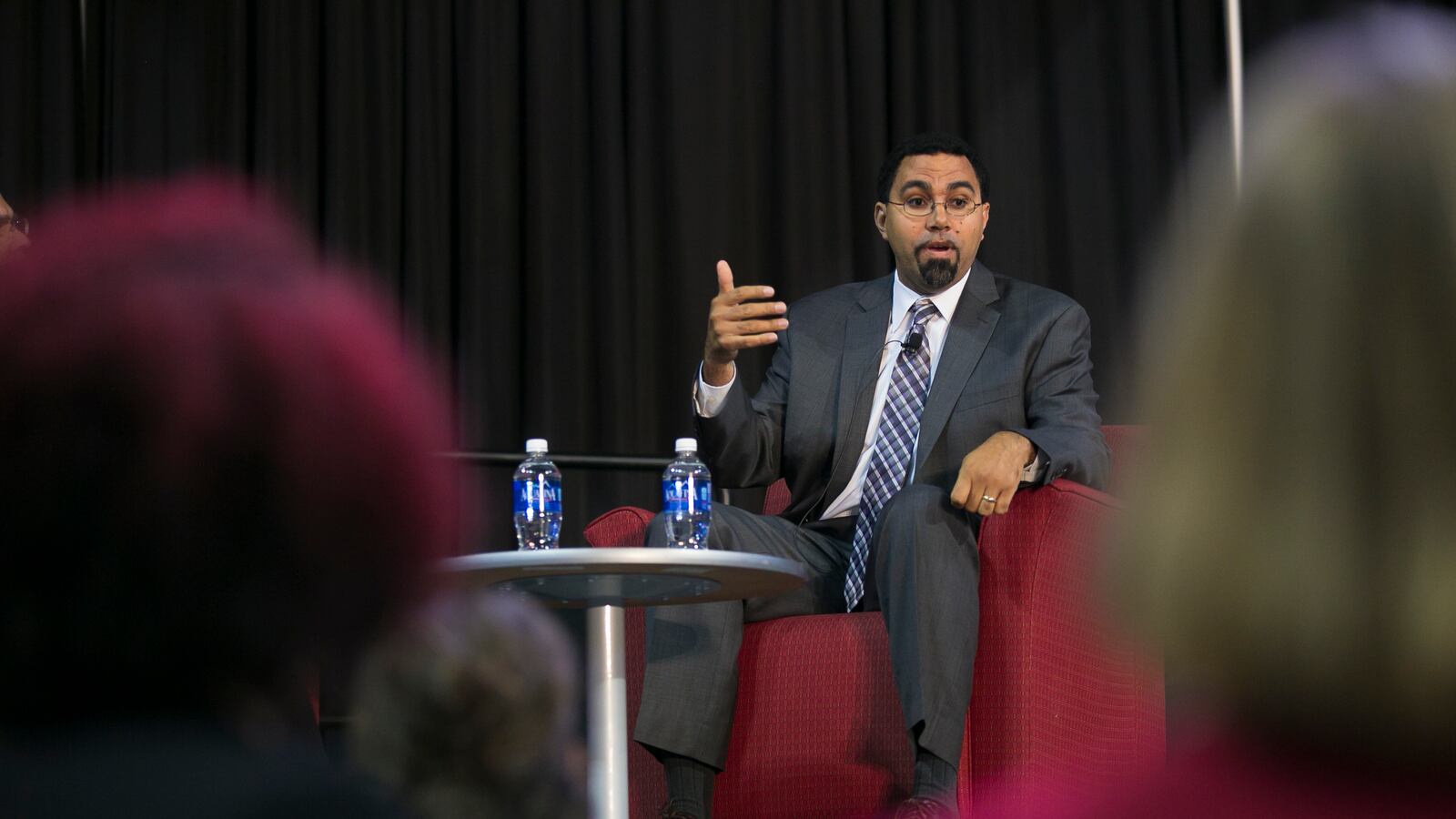Education conferences are often carefully orchestrated affairs involving panel discussions in which the participants more or less agree. Rarely do they make headlines.
But last year’s summit put on by the New Schools Venture Fund — a “venture philanthropy” that supports education reform causes, including charter schools — was an exception.
Its emphasis on social justice, with one attendee describing the event as reminiscent of a Black Lives Matter rally, sparked a heated debate about the role of race and politics in education, as below-the-surface tensions within that movement went public. The election of Donald Trump and his appointment of Betsy DeVos as education secretary have only served to exacerbate the strains.
This year’s conference, which includes a few big names, including former Secretary of Education John King, will feature some discussion of these debates, as well as a heavy focus on education technology.
Chalkbeat will be attending this year, and here’s what we’ll be looking for:
Can right and left get along?
The debate about last year’s summit was sparked by a blog post from the Fordham Institute’s Robert Pondiscio. He described a “leftward lurch” that was going to “push conservatives out of education reform,” as epitomized by the conference’s focus on social-justice issues. This led to a flurry of blog posts, internal debates, and open letters about political divides and racial diversity within the ed reform movement.
Some on both sides of the debate worried that long-running bipartisan support for charter schools and teacher accountability initiatives — recall Jeb Bush and Mitt Romney both praising President Obama’s education agenda — would be weakened.
In a nod to this issue, this year’s summit’s closing session is titled “Why Can’t We Be Friends?: Disagreements, Tradeoffs and Common Ground,” and features panelists with diverse ideological perspectives, including Shavar Jeffries of Democrats for Education Reform and Matt Ladner of the Charles Koch Institute.
How do people talk about DeVos and Trump?
Since the last summit, U.S. politics has been turned upside down — a new president and secretary of education are promoting school choice, but not the brand that’s generally popular at New Schools.
Some charter supporters worry that DeVos and Trump will make the topic politically toxic and are much more skeptical of private school vouchers, DeVos’s signature issue. Although the National Alliance for Public Charter Schools initially praised Trump’s proposed budget — which directs more money to charter schools, but cuts from the education budget — a number of charter leaders criticized it in an op-ed in USA Today, as did DFER.
“We want to join with all those who are fighting to defend public education as an essential pillar of our democracy,” the charter leaders wrote.
Notably, there’s not much about Trump, DeVos, or private school vouchers on the NSVF agenda, suggesting that the conference may steer clear of the topic — at least officially. We’re sure it will be a frequent topic of conversation at receptions and hotel bars after the official programming.
A “big bet” on ed tech — but where’s the evidence?
The agenda does include a heavy focus on education technology and “personalized learning,” or the idea that technology can be used to tailor teaching to specific students’ needs. Sessions include “How to Personalize Learning with Rigor and High Expectations,” and “Is Ed Tech the Great Equalizer? Designing Products for Equity,” among several others.
Even the description of the one panel on the new federal education law starts by saying, “The Every Student Succeeds Act (ESSA) brings tremendous opportunities for innovation and personalized learning.”
This emphasis dovetails with a recent report from NSVF calling on philanthropists to make a “big bet” on technology-based innovation in schools. Indeed, two of the biggest sponsors of the event — The Gates Foundation and the Chan Zuckerberg Initiative — are key supporters of edtech. (The Gates Foundation is also a funder of Chalkbeat’s.)
That attention raises an obvious question: What’s the evidence that such an approach is likely to pay off for students? The research base on personalized learning is fairly thin, particularly when looking beyond standardized test scores. Supporters can point to some evidence of success, but critics can also point to a lack of impact in other instances, and an overall lack of studies on the topic.
We’ll be watching to see what studies are cited at panels promoting personalized learning. If they aren’t, we’ll be asking where the optimism about a generally unproven strategy stems from.
How is the charter school movement evolving?
One session, “Charters: Bigger, Better or Different?” points to three separate visions for the charter school movement: a focus on growth (expand quickly) vs. quality (be really good) vs. variety (offer families a number of different options). This panel features the heads of three charter networks, including KIPP.
In fact, the conference will be attended by many of the leaders of the highest-profile charter school networks. And the charter world is as big, numbers-wise, as it’s ever been. That means new pressures and lots of ideas about how the sector should evolve.
Should charters grow more, or less, quickly? Should the sector focus on creating different educational options for families to choose from? Should no-excuses charter schools change their approach to discipline? Will anyone discuss much-maligned virtual charters, which have posted abysmal test scores, leading even many charter advocates to call for them to be more tightly regulated?
There may well be tension between the different goals, so we’ll be paying attention to what different panelists have to say on the topic — and what approach charter leaders believe should be emphasized.


